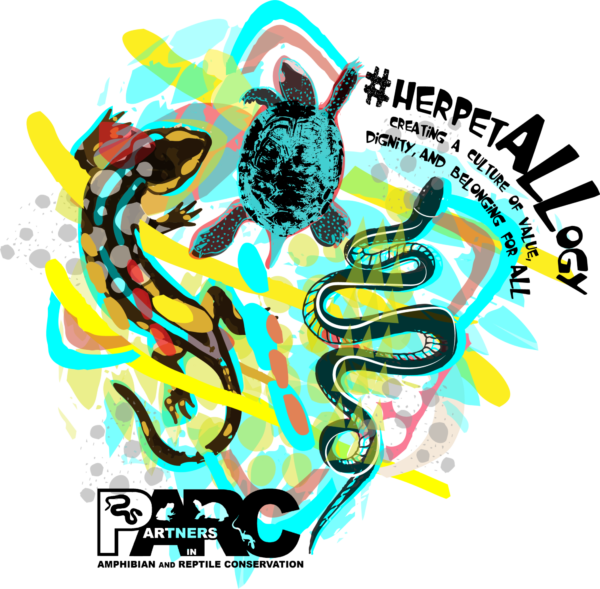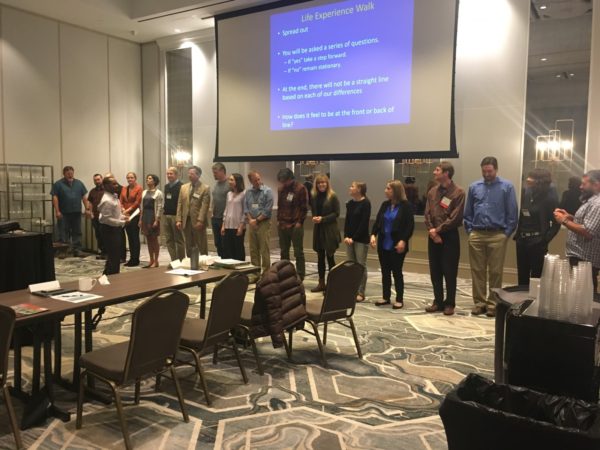The National Diversity, Equity, and Inclusion Task Team (DEITT) is a learning, community building, and action space that meets once per month over zoom. Our goal is to help create a culture of value, dignity, and belonging for all. Just like biodiversity is beneficial to an ecosystem, we believe that diversity in PARC is beneficial to the conservation of the critters we love. All are welcome to join us – email us if you are interested in getting involved.
The DEITT was started in 2017 by Alex Navarro and Neha Savant.

PARC’s mission: Forging proactive partnerships that facilitate conservation of amphibians, reptiles, and the places they live.
PARC’s Core Value of Inclusivity and Collaboration: PARC is a network that is open to people of all backgrounds, skills, and perspectives, thus providing a community of practice, which coordinates and cooperates toward mutual or complementary goals.
National Diversity, Equity, & Inclusion Task Team mission: To improve cultural competency, increase inclusion, engage a wide audience and recruit & support members from a diversity of social and cultural characteristics including, but not limited to, race, skin color, ethnic heritage, class, religion, geography, gender identity, sexual orientation, mental/physical ability, age and more.
On August 12, 2020, PARC’s Joint National Steering Committee and the Diversity Equity and Inclusion Task Team sent a letter to PARC members and to all Amphibian and Reptile Conservationists to communicate some reflections and next steps on the subject of racial equity within our network and field of amphibian and reptile conservation. You can download the letter here.
Key Objectives:
- Improve cultural competency
Enable PARC members to work with people from different backgrounds, approaches and worldviews towards creative conservation solutions that integrate multiple perspectives.
- Increase PARC’s capacity for inclusion
Ensure all PARC members feel respected, included and valued at PARC.
- Engage & attract diverse audiences & members
Create opportunities for engagement from a diverse range of stakeholders and communities.
DEITT ACTIONS
- Improving cultural competency
Diversity training for PARC leadership: The DEITT led a diversity and inclusion workshop during the annual in-person meeting of PARC leadership held during the North American Wildlife and Natural Resources Conference in Norfolk, VA in March 2018. Led by Jeramie Strickland of the U.S. Fish and Wildlife Service, this workshop involved several engaging activities and discussions that demonstrated the importance of diversity in conservation fields, as well as the PARC network.Inclusion, equity, and diversity presentation: To set a tone of inclusion at PARC’s regional meetings, the DEITT developed an oral presentation to (1) define inclusion, equity, and diversity; (2) highlight the strengths of inclusion, equity, and diversity in relation to PARC’s mission and conservation; and (3) update PARC members with progress and projects put forth by the DEITT. So far, the presentation has reached Northeast, Southwest, Michigan, and Ohio PARC; PARC’s Federal Agency Steering Committee; and the US Forest Service. Please use our presentation in whatever way you find most useful. We simply ask you retain PARC logos on slides. Slides that need to be modified based on presenter or region and slides that can be exchanged have indicators in the notes. Please see the notes section of each slide for an example script as well. Link to Presentation. Regional meeting breakout session: In addition to a presentation, the DEITT led a breakout session at the Northeast PARC meeting in 2018 to facilitate discussions about the role of personal identity in conservation science and management. The session attracted 15 attendants and provided a successful template for future breakout sessions at other regional meetings.
- Increasing capacity for inclusion
Demography and inclusion surveys: An initial step in achieving the goals of the DEITT is to assess the current atmosphere and dynamics in the PARC network. As such, the DEITT has developed a post-meeting survey tool to assess the current attitudes among members and the tone of interactions that occur at regional meetings. The survey was launched in February 2018 and has been put into action in 4 PARC regions: Southeast, Northwest, Northeast, and Southwest. The team collected data from 134 respondents in year 1 and hopes to grow that number in year 2.Diversity statement and strategic plan: The DEITT has drafted a document to define PARC’s dedication to diversity in the context of PARC’s core values and mission. In addition to the diversity statement, this document will identify actionable and measurable goals for increasing inclusion, equity, and diversity in the PARC network. Many diversity-related initiatives require major shifts in structural and cultural values and commitment to both short-term strategies that result in immediate change as well as long-term strategies that lay the groundwork for incremental change. This will be a “living” document that will grow along with the PARC network. PARC will use this document in conjunction with its strategic plan and operations plan for decision-making and prioritization, as well as holding the organization accountable to its core value of inclusivity and collaboration. Projected date for finalized document: Spring 2019.Keynote speaker surveys: The DEITT has developed a tool to survey past and future PARC-invited keynote speakers to gain insight on the identity and experiences of keynote speakers at PARC’s regional meetings. Surveys were launched in 2018, and data collection is in progress. The goal of this survey is to provide valuable information to regional co-chairs and meetings planners who are charged with keynote speaker selection. For those interested in finding keynote speakers from a variety of backgrounds, there is an excellent online resource for finding such speakers, where ecologists and evolutionary biologists self-nominate themselves: diversifyeeb.wordpress.com.

- Engaging & attracting diverse audiences & members
Scholarships for youth outreach and education: The DEITT partnered with The Amphibian Foundation, The Amphibian and Reptile Conservancy (ARC), and USFS to bring a week of Critter Camp to underserved youth in Atlanta. Critter Camp is a science-based, exciting educational experience that emphasizes the importance of reptiles and amphibians and their roles in a healthy ecosystem — how they should be respected, marveled at — but not feared. In total, this partnership provided scholarships to 15 children, reducing out-of-pocket costs from $350 to just $25 per student, as well as stipends for 2 volunteer staff members. Scholarships to attend regional meetings: The DEITT has recently formed a project team charged with developing, promoting, and awarding scholarships to broaden participation at regional meetings. Preliminary results from DEITT demography and inclusion surveys suggest that the cost of travelling to meetings is a barrier to participation in the PARC network. By supporting those who are interested in PARC but unable to afford the myriad of costs associated with attending meetings, the DEITT will directly support promising conservation biologists and enhance the diversity of PARC’s membership. Social media campaign: The DEITT launched a Twitter campaign (@HerpetALLogy) to showcase the diverse identities, experiences, and perspectives within the fields of herpetology and conservation biology. Each week, a member of the community was given access to the @HerpetALLogy account for a 24-hr period and engaged with followers by sharing their own stories and/or engaging in constructive dialogue.
DEITT Member List
Steering Committee: The following members guide, support, and create initiatives and learning experiences for the task team:
- Marilyn Sobel (co-chair)
- Kirsten Hecht (co-chair)
- Staci Amburgey
- Bob Brodman
- Grover Brown
- Jen Lamb
- Mark Mandica
- Neha Savant
- Anat Belason

